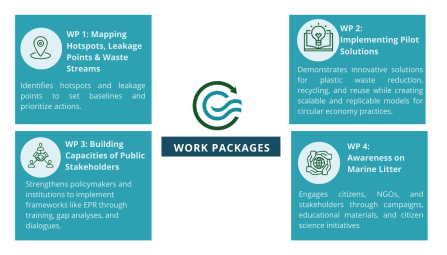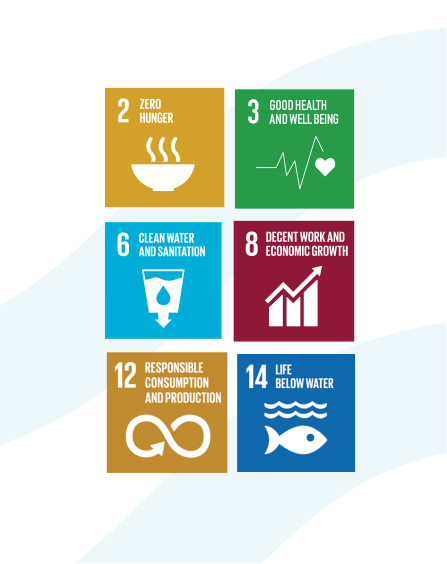

PROTEGO’s Contribution to the Sustainable Development Goals (SDGs)
The PROTEGO project aligns with several United Nations Sustainable Development Goals (SDGs) by addressing marine plastic pollution and fostering sustainable waste management practices in Ghana and Nigeria. Through its initiatives in circular economy, policy development, and community engagement, the project contributes to the following SDGs:
· SDG 2: Zero Hunger
Plastic pollution affects food security by contaminating water sources and harming fisheries, which are a vital source of nutrition and income for coastal communities. PROTEGO helps reduce marine plastic waste, supporting healthier fish stocks and ensuring cleaner water bodies for food production.
· SDG 3: Good Health and Well-being
Exposure to plastic pollution, including microplastics and hazardous chemicals, poses significant health risks to humans and marine life. By reducing plastic waste leakage into marine and freshwater systems, PROTEGO helps improve public health, sanitation, and overall well-being.
· SDG 6: Clean Water and Sanitation
Plastic waste often clogs drainage systems and contaminates rivers and coastal waters, affecting access to clean water. The project promotes improved waste collection, recycling, and policy enforcement, contributing to cleaner water sources and enhanced sanitation infrastructure.
· SDG 8: Decent Work and Economic Growth
PROTEGO supports green job creation in the waste management and recycling sectors. By fostering circular economy models, the project helps build sustainable employment opportunities for waste collectors, recyclers, and entrepreneurs, improving livelihoods while tackling plastic pollution.
· SDG 12: Responsible Consumption and Production
A key focus of PROTEGO is reducing single-use plastics and encouraging sustainable production and consumption patterns. By implementing Extended Producer Responsibility (EPR) schemes, supporting alternative materials, and driving behavioral change, the project minimizes waste generation and promotes circular economy solutions.
· SDG 14: Life Below Water
Plastic waste severely impacts marine biodiversity in the Gulf of Guinea, threatening fish populations, coral reefs, and ecosystems. PROTEGO’s efforts in marine litter prevention, recycling, and policy development contribute to protecting marine life and ensuring healthier ocean environments.
Through these contributions, PROTEGO is creating lasting environmental, economic, and social impacts, aligning with global sustainability goals to combat marine plastic pollution and drive systemic change in w
